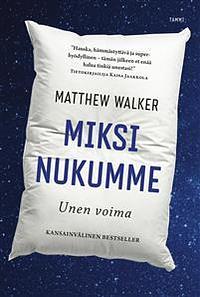Take a photo of a barcode or cover
Great book with practical reasons and solutions for a good night sleep
informative
slow-paced
EVERYONE NEEDS TO READ THIS BOOK. It is SO SO important. Wow. I found this book fascinating and that’s really saying something because this is NOT my typical read. I would take notes while reading and share what I learned everyday with my husband. Only negative of this book is it doesn't spend much time at all explaining what to do if you have trouble sleeping, only focusing on the reasons it's important to get those 8 hours. This book is intended to serve as a scientifically accurate intervention. Humans need 8 hours of sleep. Knock it down to 6 and the side effects are staggering. Your brain is doing so much for you while you sleep and the outcomes effect…..
1. Health: Overall life expectancy, immune system from the standard cold to cancer, mental wellness, energy levels, pain tolerance, weight control, reproductivity
2. Brain development: memory retention and connection happens while you sleep. Your IQ will increase with more sleep. Your athletics and music will also improve.
3. Work: Productivity, efficiency, creativity, work enthusiasm, good decision making, integrity
4. Safety: Tired doctors make more mistakes, drowsy driving is responsible for more accidents and is more deadly than driving under the influence of drugs and alcohol.
Here’s a few of the MANY cool tidbits I learned:
1. If you only get 4-6 hours of sleep a night the week before receiving a flu shot, your body will produce less than half of the normal antibody response required. Receive 7 or more hours and you’ll receive a powerful and comprehensive immunization response.
2. Dolphins and other aquatic mammals and birds can turn off half of their brain to sleep while the other half stays awake. Humans do this on a much lesser scale when they are sleeping somewhere knew. Half of their brain stays on alert a bit more and that’s why you don’t get good sleep in hotels.
3. If you go to bed at midnight and wake up at 6 am you only got 6 hours of sleep, instead of the recommended 8. Since your brain does most of the REM sleep at the last part of the night (aka early morning hours), you will lose 60-90% of your REM sleep, even though you are only losing 25% of your total sleep.
4. Participants were taught information and tested again 7 days later. The first group who got normal sleep remembered everything they learned and performed better than when they initially learned it. The second group got drunk on the first night after learning (2-3 shots) and they forgot more than 50% of what they learned. The third group got normal sleep the first two nights but then got drunk on the third night after learning (2-3 shots). They lost 40% of the knowledge.
5. Measured the sleep of more than 150 healthy men and women for a week, then squirted the flu virus up their nose. 50% of those who slept less than 5 hours ended up sick while only 18% of those who slept 7 hours or more got sick.
6. Natural killer cells will destroy cancer cells, but one night of 4 hours of sleep will take away 70% of your killer cells (relative to a full 8 hours of sleep). Night time shift work increases your odds of getting cancer. Denmark has paid workers comp to women who developed breast cancer while working at nurses and air cabin crew. Sleeping 6 hours or less increases your risk of developing cancer by 40%, relative to those sleeping 7 hours or more.
7. Your sense of hunger increases when you don’t get 8 or more hours of sleep. If you only get 5 hours of sleep, your appetite remains unsatisfied even after a full meal. A sleep deprived body will cry famine in the midst of plenty. Sleep loss increases levels of chemicals that are produced by the body that are very similar to cannabis, they increase your desire to snack. It also changes what we eat- cravings for sweets, salty snacks, and carbs all increased by 30-40% when sleep was decreased by several hours each night. Ample sleep helps with impulse control. Those who slept 5.5 hours, had more than 70% of the pounds lost come from lean body mass, aka muscle not fat. The group that got 8.5 hours of sleep had well over 50% of weight loss coming from fat while preserving muscle.
9. Three year olds who sleep 10.5 hours or less have a 45% increased risk of being obese by age 7 compared to those who get 12 hours of sleep a night.
1. Health: Overall life expectancy, immune system from the standard cold to cancer, mental wellness, energy levels, pain tolerance, weight control, reproductivity
2. Brain development: memory retention and connection happens while you sleep. Your IQ will increase with more sleep. Your athletics and music will also improve.
3. Work: Productivity, efficiency, creativity, work enthusiasm, good decision making, integrity
4. Safety: Tired doctors make more mistakes, drowsy driving is responsible for more accidents and is more deadly than driving under the influence of drugs and alcohol.
Here’s a few of the MANY cool tidbits I learned:
1. If you only get 4-6 hours of sleep a night the week before receiving a flu shot, your body will produce less than half of the normal antibody response required. Receive 7 or more hours and you’ll receive a powerful and comprehensive immunization response.
2. Dolphins and other aquatic mammals and birds can turn off half of their brain to sleep while the other half stays awake. Humans do this on a much lesser scale when they are sleeping somewhere knew. Half of their brain stays on alert a bit more and that’s why you don’t get good sleep in hotels.
3. If you go to bed at midnight and wake up at 6 am you only got 6 hours of sleep, instead of the recommended 8. Since your brain does most of the REM sleep at the last part of the night (aka early morning hours), you will lose 60-90% of your REM sleep, even though you are only losing 25% of your total sleep.
4. Participants were taught information and tested again 7 days later. The first group who got normal sleep remembered everything they learned and performed better than when they initially learned it. The second group got drunk on the first night after learning (2-3 shots) and they forgot more than 50% of what they learned. The third group got normal sleep the first two nights but then got drunk on the third night after learning (2-3 shots). They lost 40% of the knowledge.
5. Measured the sleep of more than 150 healthy men and women for a week, then squirted the flu virus up their nose. 50% of those who slept less than 5 hours ended up sick while only 18% of those who slept 7 hours or more got sick.
6. Natural killer cells will destroy cancer cells, but one night of 4 hours of sleep will take away 70% of your killer cells (relative to a full 8 hours of sleep). Night time shift work increases your odds of getting cancer. Denmark has paid workers comp to women who developed breast cancer while working at nurses and air cabin crew. Sleeping 6 hours or less increases your risk of developing cancer by 40%, relative to those sleeping 7 hours or more.
7. Your sense of hunger increases when you don’t get 8 or more hours of sleep. If you only get 5 hours of sleep, your appetite remains unsatisfied even after a full meal. A sleep deprived body will cry famine in the midst of plenty. Sleep loss increases levels of chemicals that are produced by the body that are very similar to cannabis, they increase your desire to snack. It also changes what we eat- cravings for sweets, salty snacks, and carbs all increased by 30-40% when sleep was decreased by several hours each night. Ample sleep helps with impulse control. Those who slept 5.5 hours, had more than 70% of the pounds lost come from lean body mass, aka muscle not fat. The group that got 8.5 hours of sleep had well over 50% of weight loss coming from fat while preserving muscle.
9. Three year olds who sleep 10.5 hours or less have a 45% increased risk of being obese by age 7 compared to those who get 12 hours of sleep a night.
informative
medium-paced
informative
medium-paced
I was excited about reading this book until I learned about how Walker stretched the truth and falsified his claims. After fact checking this book and reading reviews of other people who did the same, I learned how problematic this book actually is.
informative
inspiring
reflective
medium-paced
This book really let me get the importance of a good full night sleep.
Świetne połączenie dostępnego języka z przypisami oraz dowodami naukowymi. Ogromna ilość niezwykle ciekawych informacji, tylko polecać!
Ok this book was WAY denser than I expected but that’s my fault. I think this book is important and I definitely learned from it but I just feel like this author lacked nuance/missed information for the sake of making a point
Sometimes seems to extrapolate hard from small studies, but an extremely compelling and persuasive book! Very motivating to sleep more.




